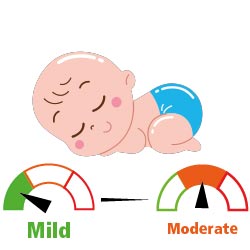- Amoxicillin 125mg/5ml suspension (w*0.27) x 3×10-14 OR Amoxicillin 250mg/5ml suspension (wx0.13) x 3×10-14
- Brufen 100mg/5ml syrup (Wx0.375) every 6-8 hours until fever subside
In excessive nasal secretions (Rinorrhea,sneezing):
- Fenistil drop 1mg/1ml ( 2 drops/kg/day divided into 3 doses)
- Apisal 9mg/ml drop 1drop 4-6 times daily
Amoxicillin :
Ear, Nose, & Throat Infections
Mild to moderate infections
- >3 months and <40 kg: 20 mg/kg/day PO divided q8hr
Severe infections
- >3 months and <40 kg: 40 mg/kg/day PO divided q8hr
Acute Otitis Media
- ≥2 months and children: 80-90 mg/kg/day PO in divided doses q12hr
- Age <2 years or severe symptoms (any age): Standard 10-day course
- >2 years with mild or moderate AOM: 5-7-day course
Lower Respiratory Tract Infections
Mild, moderate, or severe infections
>3 months and <40 kg: 40 mg/kg/day PO divided q8hr
Pneumonia, community-acquired (Off-label)
≥3 months:
Immediate release
Empiric treatment: 90 mg/kg/day PO divided q12 hr for 10 days; not to exceed 4,000 mg/day
Group A Streptococcus: 50-75 mg/kg/day PO divided q12hr for 10 days; not to exceed 4,000 mg/day
H. influenza: 75-100 mg/kg/day PO divided q8hr for 10 days; not to exceed 4,000 mg/day
Infective Endocarditis (Off-label)
Prophylaxis
- 50 mg/kg PO 30-60 min before procedure
Brufen
- Analgesic and antipyretics
- Has anti-inflammatory effect
- Suitable for Temperature( 38-38.5) C
- Not save under 6 months
- Taken After meal
- 200mg every 6-8 hours, May increase to 400mg every 6-8hours
Trade names : brufen (Taskine , Doloraz, Iburam,Remofen ,Ibugesic,Sapofen,Perofen,Rupan,Bulkaprofen,Advil liquid-gel , Profast, Nashat ,Midofen,Ibusoft).
Other concentration: 800mg and 400mg tablet 600mg tablet, 100mg/5ml syrup
Dose:
Tablets :
Syrup, suspension :
- 100mg/5ml Syrup(Wx0.375) every 6-8hours
Oral drops :
40mg/1ml
- 6-11 months : 1.25ml every 8 hours
- 12-23months : 1.8ml every 8 hours
- Skin: Urticaria, pruritus of various etiology, endogenous eczema with previous medical diagnosis.
- Respiratory system: Seasonal (hay fever) and perennial rhinitis with previous medical diagnosis.
Maximum dose : 3200 mg per day
Contraindication:
- History of hypersensitivity to aspirin or other NSAIDs
- current or recent stomach ulcer
- severe heart failure.
- severe liver disease
Pregnancy : not usually recommended in pregnancy
Dimetindene
Available forms:
- Fenistil: drop 1mg/1ml, 4mgcaps, 1mgtab
- Pedia fast: drop 0.1g/100ml, 0.01g/100ml syrup
- Alergin: drop 1mg/1ml (1 ml = 20 drops).
- Fencil: drop 1mg/1ml
- 1 ml contains dimetindene maleate 1 mg (1 ml = 20 drops).
Therapeutic indications
- Symptomatic treatment of allergic diseases:
- Relieve of itching associated with infectious diseases (e.g. chickenpox) with previous medical diagnosis or after an insect bite or stings.
Dose:
1mg/1ml oral drops, 0.1g/100ml drop:
- Adults :The recommended daily dose is 3 – 6 mg of dimetindene maleate divided into 3 doses,
- 20 –40 drops 3× a day.
- Paediatric The recommended daily dose for children 1 – 11 years is 0.1 mg dimetindene maleate/kg body
- 2 drops/kg/day divided into 3 doses.
1mg tablet:
- 1 to 2 milligrams three times daily
0.01g/100ml syrup:
- the recommended dose is 1 teaspoonful (5 ml) of a 0.01g/100ml syrup 3-4 times daily
4mg capsule :
- 1capsule once daily
Contraindications :
- Hypersensitivity to the active substance or to any of the excipientsInfants and children under 1 year of age.
pregnancy and lactation :
- Pregnancy There are no data about the use of dimetindene maleate during pregnancy.
- Dimetindene maleate should not be used in pregnant women unless the benefit of treating the mother outweighs the risk for the foetus
Breast-feeding :
- There is a well-founded presumption that dimetindene can be excreted in human milk. So its not recommended.
Side effect :
- Fatigue
- Somnolence, nervousness
Apisal 9mg/ml drop, 7.4mg/ml spray
- Nasal decongestant
- is a safe drug-free physiological saline solution
- can be used as often as needed, to cleanse and moisturize nasal passages and help in removing incrustations, bacteria, viruses, allergens or irritants entrapped in the nasal mucosa.
- Nasal Dryness & Congestion
- relieves nasal congestion by thinning mucus and moisturizes membranes
Dose in adult and pediatrics:
- 1puffs /drop 4-6 times daily
Pregnancy and lactation:
- Save
In Emergency room:
- Give antipyretic:
- Perflgan 1g/100ml intravenous injection :
Dose:
Pediatrics:
- <10kg : 0 .75ml/kg
- >10kg , <50kg : 1.5ml/kg
- >50kg : 100ml Slowly over 15 minute
Adult:
- 100ml Slowly over 15 minute
OR
- Diclofenac sodium injection 75 mg/3ml intramuscular injection :
Dose:
Pediatrics:
- > 1year : 1ml/20kg every 12 hour .
Adult:
- 25 to 75 mg(1-3ml) depending on the severity pain.
- If the pain still severe, you may decide to give a second injection after 6 hours.
- Give Antibiotic:
- Lincomycin 600mg/2ml
Dose:
Pediatrics:
- IV: 10-20 mg/kg/day divided q8-12hr
- IM: 10 mg/kg q12-24hr
Adult:
- IM: 600 mg q12-24hr
- IV: 600-1000 mg q8-12hr; not to exceed 8 g/day
OR
- Ceftriaxone injection
Dose:
Pediatrics:
- 50 mg/kg IM in single dose; not to exceed 1 g
Adult:
- 50 mg/kg IM once
- Persistent or treatment failures: 50 mg/kg IV/IM for 3 days
- Give Antihistamine In sneezing and rhinorrhea :
- Allerfin 10mg/ml IM injection :
Dose:
- 1-5 year : 25-5mg (½ ml )
- 6-12 year: 5-10mg (1ml )
- Adult : 10-20 mg (1-2 ml )
Acute sinusitis
Presentation :
- Purulent nasal discharge
- Nasal congestion or obstruction
- Facial congestion or fullness
- Facial pain or pressure
- Decreased sense of smell
- Fever
- Headache
- Ear pain
- fullness; halitosis; dental pain; cough; fatigue
Examination:
- Purulent nasal secretions
- Purulent posterior pharyngeal secretions
- Mucosal erythema
- Tenderness overlying sinuses
Lines of management :
- Antipyretics
- Antibiotics
- Symptomatic treatment:
- In nasal obstruction : use nasal decongestant
- In excessive secretions and sneezing : use antihistamine
- If not respond : Intranasal Corticosteroids :
- Helpful in reducing mucosal swelling of inflamed tissue and facilitating sinus drainage because of an anti-inflammatory effect
